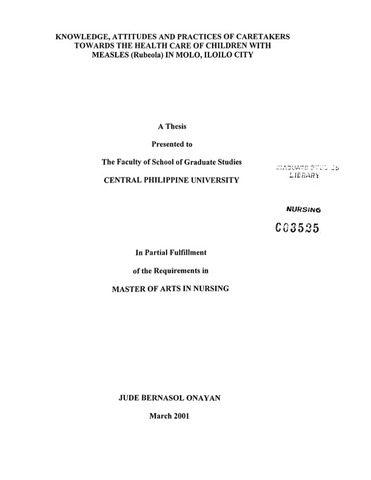Knowledge, attitudes and practices of caretakers towards the health care of children with measles (Rubeola) in Molo, Iloilo City
| dc.contributor.author | Onayan, Jude B. | |
| dc.coverage.spatial | Iloilo | en_US |
| dc.date.accessioned | 2021-04-05T06:46:57Z | |
| dc.date.available | 2021-04-05T06:46:57Z | |
| dc.date.issued | 2001 | |
| dc.identifier.citation | Onayan, J. B. (2001). Knowledge, attitudes and practices of caretakers towards the health care of children with measles (Rubeola) in Molo, Iloilo City (Unpublished Master's thesis). Central Philippine University, Jaro, Iloilo City. | en_US |
| dc.identifier.uri | https://hdl.handle.net/20.500.12852/717 | |
| dc.description | Abstract only | en_US |
| dc.description.abstract | This study was conducted to determine the knowledge, attitudes and practices of health caretakers towards the health care of children with measles in Molo, Iloilo City. Specifically, this study aimed to determine whether selected characteristics or respondents such as educational attainment and occupational status are associated with knowledge, attitude and practices of the caretakers. It is also intended to find out whether there is a relationship between knowledge, attitude and practices. Lastly, to determine the relationship between the caretakers’ knowledge about measles and their health care practices when attitude towards measles is controlled. This study was conducted in four barangays of Molo, Iloilo City in the year 2000 among 93 caretakers’ respondents with children who had experienced measles or with children less than 10 years at the time of the study. The study area was chosen since it had the following health data for the past 10 years: low measles immunization coverage, slum area and low vitamin A coverage. The result of this study showed that most of the caretakers were high school educated and were not gainfully employed or non-working. The majority had “average” knowledge about measles. The information about measles that the respondents were most familiar with the signs and symptoms of measles that include: the occurrence of fever, rashes red eyes/ conjunctivitis, cough and flu. On the other hand, the caretakers were least familiar with the information that the disease is caused by ingestion of the measles virus, and about the risk groups for measles. Furthermore, one in every three caretakers think that antibiotics are the best treatment for measles. Slightly more than half of the respondents had “good” attitude towards the care of children with measles. Most of them believed that a child with measles should not be exposed to open air, that daily bath is important to a child with measles and that having the disease gives a child a permanent immunity and that prompt treatment is important. Predominantly the caretakers had “good” practices in the care of children with measles. A high majority of the respondents gave their sick child with foods rich in vitamin A they disallow the child to play with his playmates, they use paracetamol/ analgesic o reduce fever and they follow the doctor’s prescription and advice. Interestingly, the least of their concern was maintaining the oral hygiene of the child and bathing the child daily. Data on relational analysis revealed that there was no significant relationship between educational attainment and knowledge about measles. Occupational status and knowledge about measles is not significantly related. The caretakers’ attitude towards the care of children with measles was neither associated with their educational attainment nor with their occupational status. Practices towards the care of children with measles was neither significantly related to their educational nor with their occupational status. The findings indicate that the caretakers’ knowledge about measles was influenced by their attitude towards the care of children with measles. On the other hand, there was no relationship between attitude and practices in taking care of children with measles, but practices towards the care of children with measles was related to knowledge about measles. A relationship existed between the caretakers’ knowledge and practices when attitude towards measles is controlled. Considering the significant findings and conclusions, it is recommended that Department of Health implement information, education, communication activities that emphasize on causes and transmission of the disease and care regardless of caretakers’ educational attainment and occupational status. Various methods of information dissemination such as, the use of comics, informal education and posters in the dialect should be explored. | en_US |
| dc.format.extent | iv, 97 | en_US |
| dc.language.iso | en | en_US |
| dc.subject.ddc | GSL Theses 610.73072 On1 | en_US |
| dc.subject.lcsh | Medical care--Children--Health and hygiene | en_US |
| dc.subject.lcsh | Measles--Children | en_US |
| dc.subject.mesh | Child Health | en_US |
| dc.subject.mesh | Measles | en_US |
| dc.title | Knowledge, attitudes and practices of caretakers towards the health care of children with measles (Rubeola) in Molo, Iloilo City | en_US |
| dc.type | Thesis | en_US |
| dc.description.bibliographicalreferences | Includes bibliographical references | en_US |
| dc.contributor.chair | David, Fely P. | |
| dc.contributor.committeemember | Caipang, Natividad C. | |
| dc.contributor.committeemember | Alibogha, Salex E. | |
| dc.contributor.committeemember | Chin, Fely P. | |
| dc.contributor.committeemember | Alinsao, Violeta A. | |
| dc.contributor.department | School of Graduate Studies | en_US |
| dc.description.degree | Master of Arts in Nursing | en_US |
| local.subject | Caretakers | en_US |
| local.subject | Health care | en_US |
| local.subject | Measles (Rubeola) | en_US |


